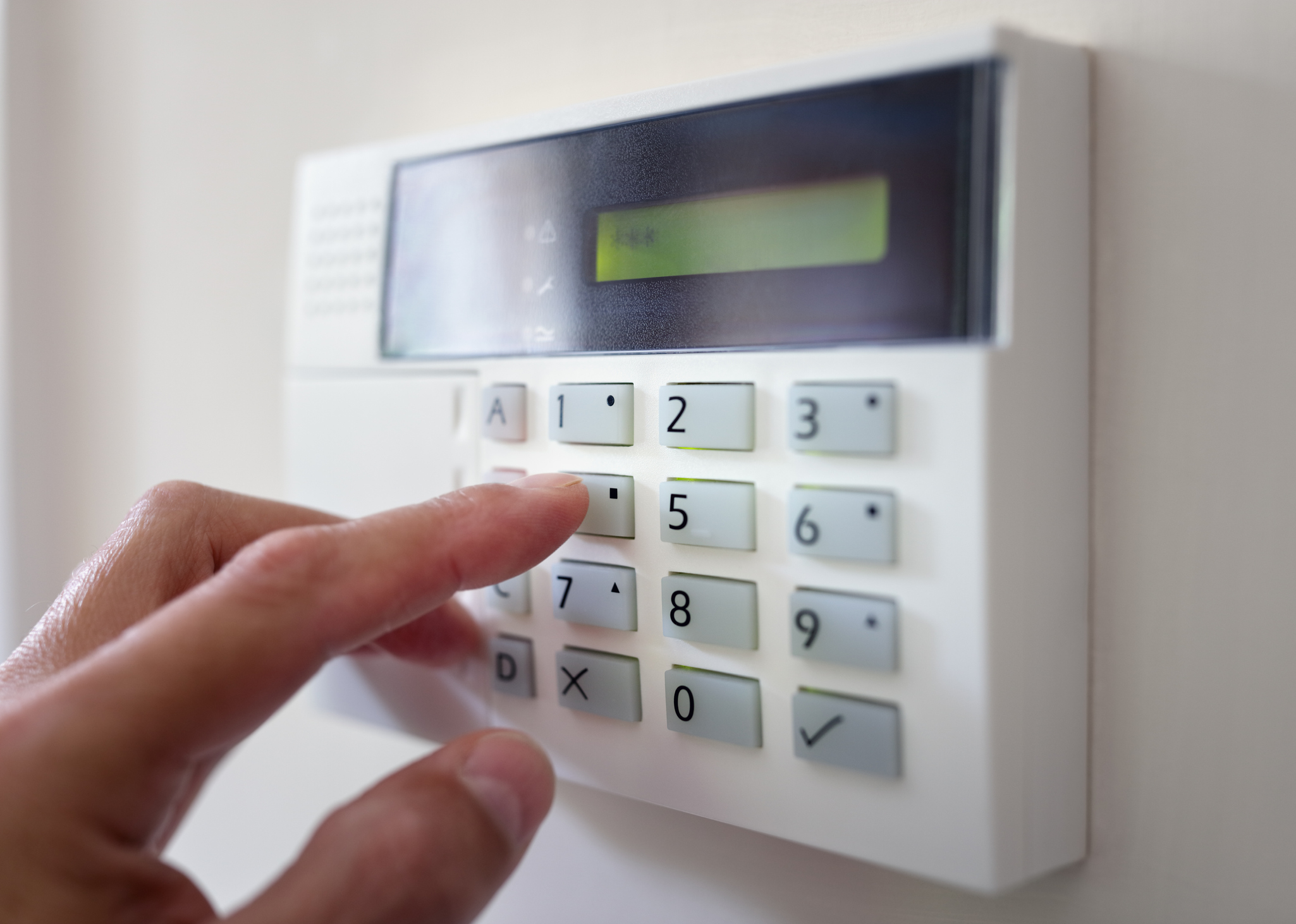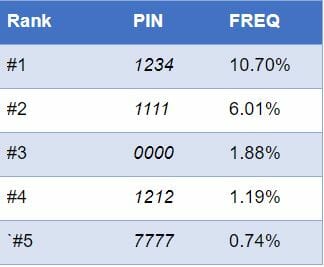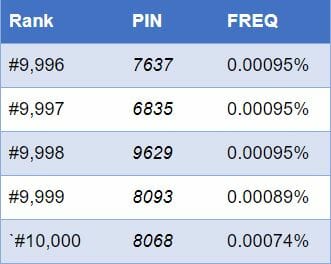
How To Set a Secure PIN Code for Your Burglar Alarm System
Your home or business burglar alarm system increases the safety of everyone and everything within. It’s always comforting to know that you have a system in place to alert you when there is an intrusion, so that you can take precautions to secure yourself and all the people and things you love most.
While a professionally installed burglar alarm system will reliably alert you and alarm monitoring staff of an intrusion, consider the outcome of an attempted crime if the burglar correctly guesses your alarm’s PIN code and disables your alarm system.
Can a random burglar actually guess your PIN code? What can be done to stop this from happening?
There are 10,000 four-digit PIN code combination possibilities from 0000-9999. The most common four-digit PIN? 1234.
A recent study of 3.4 million PIN codes found that 1234 is the most common PIN, occurring roughly 11% of the time. Put another way, 374,000 out of the 3.4 million alarm systems used by homeowners and business owners use the code 1234.
We can assume that 1234 is chosen most often because it’s easy to remember. Let’s take a look at the top five most common PIN codes to see if code simplicity is a top priority for most people.

Each of the top five most used PINs are composed of sequential or repeating digits. These codes are all easy to remember.
But the trend doesn’t stop there. All 19xx PIN code combinations pop up in the top-fifth of the data. Think about it: 1972, 1985, 1998… what do all 19xx PINs have in common? They correspond to years. This suggests that important dates, such as birth years, are popular four-digits PIN codes. PINs that are coded as month/day, like 0417, 0921, 1124, etc., are also extremely common—but far more difficult to guess.
By identifying the most common PIN codes and performing a brute force attack, an intruder may successfully gain access into a home or business in a much shorter time than trying every PIN combination in sequential order. In other words, someone without knowledge of a PIN code is more likely to guess the code correctly by trying 1234, a repeating code like 1111, or by trying a known birth year or birth date. It would be impossible for a person to guess a PIN code in a reasonable amount of time if they had to try all 10,000 combinations.
Sequential digits, repeating numbers, and the 19xx PIN code sequences are much easier to guess than a truly random four-digit number.
The least common PIN codes don’t follow a pattern.
Unlike the most commonly used PINs, which are both easy to remember and follow a specific pattern, the five least common PIN codes are much more random.

Just 25 of the 3.4 million codes were 8068, which makes it the least common four-digit code. Statistically, it would be near impossible for someone to guess any of these uncommon codes. Note that the least commonly used PIN codes start with 6, 7, 8, or 9, suggesting that alarm users are biased towards sequences starting with 1 through 5.
This doesn’t mean you should rush to change your PIN to 8068. But what you should do is avoid easily guessed PINs, such as repeating digits or the birth year of a son or daughter.
How can you increase the strength of your PIN?
You don’t want anyone to guess your burglar alarm PIN code. Here are some ways to ensure your home or business remains secure.
Never use default PINs. Most security systems come with a default system code, such as 0000, that is meant to be changed once installed. It’s important to change this code, as the default PIN is often the same for every device made by the manufacturer. Changing the default code is critical to ensuring your home is protected.
Avoid using patterns and sequential numbers. Don’t use codes like 1234 or 1111. Any variation of repeating numbers is predictable and not as secure as non-repeating numbers. Even though they are easy to remember, they can compromise your home or business security. If you think that you’ll forget the code, be sure to jot it down in the Notes app on your phone, in a password-protected computer, or on a piece of paper that you store in a safe place.
Don’t use birth years. If a criminal guesses that your PIN code is a year, and glances at the photos you have on the mantle and suspects that it’s the birth year of one of your children and they’re right, then you have effectively given them a three-digit head start.
Install the burglar alarm panel out of sight. Your burglar alarm provider should help you determine where best to install the burglar alarm panel, so this might not be a problem for you. But it’s worth noting—you want to be sure that nobody can see you type in the code. As long as the panel is not in clear view of a window, or in a public space like the lobby of your business, then you’re good to go.
Periodically change your PIN. At some point in time, you’ve probably given your PIN code to babysitters, family members, house watchers, friends, neighbors, and others, just so they don’t accidentally set off the alarm. But since so many people know, it’s worth changing the PIN code once every year or so.
It’s also smart to change the PIN code to keep the keypad in good condition. Over time, typing in your code can wear out the buttons, which can make it much easier for someone to guess your code. Again, you can avoid this by changing up your PIN once a year.
Your burglar alarm system is an integral part of your home or business security. But it’s not nearly as effective if you set an obvious, easy-to-guess PIN code. You can set the most secure code if you avoid sequential numbers, years and dates, and change your PIN every year.
Bay Alarm is a leading provider of residential and commercial burglar alarm systems. Our expert technicians can get you comprehensive security with the best technical support in the alarm industry. Contact us today for a quote!
Start a conversation with a Bay Alarm security expert.
Related Articles
Agricultural businesses face a variety of security concerns. They have to protect livestock, expensive machinery, and... Read More >
Preventing theft and inventory shrinkage is crucial for retail and grocery stores already challenged by razor-thin... Read More >
Security guard services offer on-the-ground protection for businesses seeking an additional layer of safety for their... Read More >
The Phoenix metropolitan area continues to experience incredible population growth. With year-round sun, affordable housing, and... Read More >
Office buildings pose a variety of security challenges that businesses must address to safeguard their people,... Read More >
Retail theft is one of the leading causes of business owners’ stress and economic hardships. In... Read More >
Outdoor and remote locations can push traditional surveillance systems to their limits. Fixed systems face challenges... Read More >
Commercial earthquake preparedness is critically important, especially in a city like San Francisco with its long... Read More >
As the backbone of supply chain management, warehouses play a crucial role in storing, managing, and... Read More >
Hospitals face many security challenges, one of which is ensuring proper storage and monitoring of controlled... Read More >
It’s common to think of cybersecurity and physical security as two separate operations. However, in the... Read More >
Door locks can be traced back thousands of years, making them one of the oldest and... Read More >
The recent wildfires in Los Angeles have caused unprecedented damage to homes, businesses, and landmarks, on... Read More >
The holiday season is a time for joy, family, and celebrations—but it’s also a time when... Read More >
In an emergency, every second counts. Whether it’s a threat to a school, bank, store, or... Read More >
With crime on the rise in major cities, the importance of security systems has never been... Read More >
If you live in California, you are no stranger to the challenges of getting insurance. It’s... Read More >
Fire safety is a priority everywhere, but in California it’s especially urgent. To be prepared, business... Read More >
This Saturday, May 4th, the St. Mary’s College (SMC) Men’s Rugby team will face Navy during... Read More >
Protecting educational campuses and facilities is an increasingly urgent and complicated problem. Campus buildings can be... Read More >
Is it time to update your business’s security system, but you’re unsure where to start? We... Read More >
Managing properties, whether one or multiple, means constantly juggling challenges. Dealing with buildings in different cities... Read More >
As security technology advances, so do the options for customizing security protocols. A security protocol tells... Read More >
Live video monitoring is a next-generation security service that combines new technologies in threat detection (way... Read More >
Businesses and people are now using facial recognition technology to make payments, bank online, and as... Read More >
In their research report on “The Future of Physical Security,” execs from Microsoft and Accenture interviewed... Read More >
Customer: Laborers Training School Laborers Training School provides construction-based labor training to union workers in multiple locations... Read More >
As we mentioned in a previous article, several trends in the security market have made live... Read More >
News about artificial intelligence is everywhere these days. So it’s no surprise that business owners are... Read More >
The best runners in the world aren’t simply fast; they’re efficient. The most popular cars don’t... Read More >
What are security GUARD services? Security agent services (SAS) are live security guards who work on... Read More >
A typical customer in 2023 wants—and expects—a shopping experience that works for them. A challenge for... Read More >
There’s no denying that AI-powered technology offers you a chance to step up your business’s security... Read More >
You’ve probably heard of behavioral analytics. It’s everywhere these days, shaping our world and dramatically influencing... Read More >
Understanding who is at your business—and when—is a key priority for most business owners. Another obvious,... Read More >
Video security has come a long way, so much so that the full capabilities of a... Read More >
What is live video monitoring? Live video monitoring is a commercial security service that deters crime... Read More >
You can pay your Bay Alarm bill in one of three ways: through our online portal,... Read More >
According to Security Magazine, more than 2,000 first-responder agencies across the US currently use drones and... Read More >
Scaling a business is an exciting time filled with new possibilities. But it can also bring... Read More >
If you’re relatively handy and feel like you have a solid understanding of technology, you might... Read More >
A video security system is only effective if it’s installed properly. The most advanced, AI-based camera... Read More >
Preserving employee safety can be a big challenge when expanding your business to multiple locations. As... Read More >
According to the National Insurance Crime Bureau, more than one million cars were stolen across the... Read More >
Has a speeding car in the next lane ever distracted you from seeing a pothole until... Read More >
Every business owner deals with risk: it’s part of doing business. Some risks are worth taking,... Read More >
An unsafe work environment poses hazards for businesses beyond the physical risks to employees. It can... Read More >
The best modern business security systems feature some of the most advanced technology on the planet.... Read More >
Build a culture of safety the right way Protecting employees and the office work space takes... Read More >
Warehouses are complex environments that present many potential hazards to employees. According to the Occupational Safety... Read More >
Protect Your Business Without Breaking the Bank Protecting staff, inventory, and physical property is a priority... Read More >
Security tools work best when they fit the exact needs―and capacity―of your business and staff. The... Read More >
Implementing an effective security system for your business isn’t as simple as installing a camera, setting... Read More >
Following business safety regulations isn’t a choice but an obligation. Ignoring compliance standards not only puts... Read More >
Business leaders know how difficult choosing a security system can be. Every organization has specific needs... Read More >
Securing your business is crucial for longevity and future success. Maintaining a safe work environment goes... Read More >
Researching business security systems can be frustrating and confusing. There are many moving parts, and when you ask for the cost, the answer is usually, “It Read More >
One of the most frequent reasons business owners approach security companies is, unfortunately, one of the... Read More >
Keeping up with trends and technological advancements in the security industry can be challenging. Knowing where... Read More >
Robbery, theft, and arson cost US businesses over $17.2 billion in losses in 2021. As a... Read More >
With the rapid pace of technology, business security systems can become outdated faster than ever. Seeing... Read More >
For businesses concerned about deterring theft, vandalism, and other costly threats to their property and inventory,... Read More >
Waste is kindling for fires. If you work in the waste industry, you are likely aware... Read More >
The numbers don’t lie. Despite all the focus on cybersecurity, cybercriminals remain a costly threat to... Read More >
Company Known for its Security Expertise Offers Tips on How to Prevent Being a Victim. CONCORD,... Read More >
Contact sensors are security devices typically installed on doors and windows. They can notify you and... Read More >
Standard commercial security guard services include agent response, guard patrol, and standing guard, all of which... Read More >
Biometric security systems digitally identify people through biological signatures, like fingerprints, facial recognition, and eye scans.... Read More >
Are you hesitant to get a security and fire alarm system for your business due to... Read More >
Fire alarm systems keep buildings and building occupants safe from fires. While it is easy to... Read More >
Catalytic converter theft has become a big issue for car lots as the price of materials... Read More >
An IP camera, or internet protocol camera, is a type of digital security camera that receives... Read More >
A geofence is a virtual perimeter, or boundary, around a specific, real-world location. A geofence can... Read More >
Despite advanced security technology, false alarms do happen. Non-emergency events are major strains on local emergency... Read More >
CONCORD, CALIF. – Bay Alarm, a seventy-five-year-old family owned and operated security company, doesn’t just protect... Read More >
Video alarm verification pairs your security system with an alarm monitoring center. In the event an... Read More >
A motion sensor, or motion detector, is an electronic device that uses a sensor to detect... Read More >
A fire alarm system is one of the most important security features of any building—they are... Read More >
Traditional metal keys can be easily lost, locks must be professionally re-keyed if an ex-employee fails... Read More >
Modern security camera systems are great for monitoring your home or business, as many systems offer... Read More >
For those looking to increase the safety of their home or business, it can be tempting... Read More >
As a small business owner, you need more than just a security camera or burglar alarm.... Read More >
Constructing a new commercial building—be it a retail space, apartment complex, skyscraper, or sporting arena—is a... Read More >
There are a wide variety of home and business security devices and systems. You can opt... Read More >
On Tuesday, July 14, the Contra Costa Board of Supervisors approved Bay Alarm Company’s donation to... Read More >
Many homeowners have adopted home automation technology due to its convenience and security. Z-Wave, one of... Read More >
In 2016, there were over 11,000 reported construction-site equipment thefts in the United States, which accounted... Read More >
St. Mary’s College recently had their Steadauto.com car raffle to benefit their Galloping Gaels Fund and... Read More >
A cyber security breach, or data breach, is an intentional or unintentional release of private information... Read More >
Whether you’re planning a summer vacation for the whole family, or you and your spouse are... Read More >
The coronavirus pandemic (COVID-19) is shifting most day-to-day work operations from the office to the home.... Read More >
Smart home technology includes a vast variety of wirelessly connected devices. When it comes to entertainment... Read More >
With California under shelter-in-place orders and everywhere across the nation practicing social distancing, Santa Clara County... Read More >
The California State Fire Marshal recently announced that it is still essential for contractors to ensure... Read More >
Homeowners occasionally find themselves shopping for a new home security services provider, whether because of dissatisfaction... Read More >
As doorbell cameras become more pervasive, there are also an increasing number of cases in which... Read More >
Fire is one of the top risks to any small business. According to the National Fire Prevention... Read More >
While you can’t always predict supply and demand, ensuring the protection of your business is one... Read More >
With natural disasters being an ever present concern, we wanted to help bring to mind some... Read More >
Smart home devices are growing in popularity, and doorbell cameras are shaping up to be a... Read More >
Is Airbnb safe? Check out these security tips before you list your home on this vacation... Read More >
Now in its 35th year, National Night Out (NNO) was founded in 1984 in a western... Read More >
Bay Alarm is proud to be a title sponsor and partner with the California State Sheriffs... Read More >
April 10, 2019 CONCORD, CALIF. – Bay Alarm continues to grow and expand in Southern California... Read More >
CONCORD, CALIF. – Bay Alarm, the largest independently owned security company in the United States, got... Read More >
CONCORD, CALIF. – Bay Alarm, a family owned and operated security company dedicated to protecting homes,... Read More >
Pacheco, CA. April 6, 2016 – Two of Bay Alarm’s leading executives have been inducted into the Security... Read More >
The Contra Costa County Office of the Sheriff operates the Law Enforcement Training Center (LETC)... Read More >

